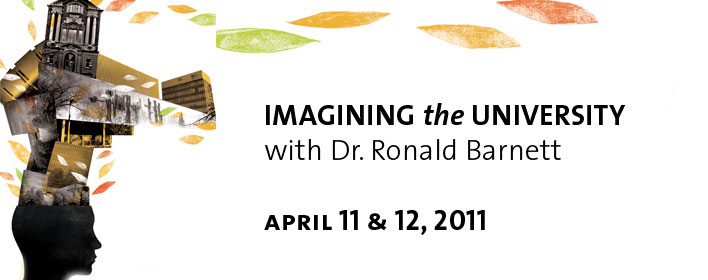Imagining the University

Date: April 11, 2011 - 2:00pm to April 12, 2011 - 10:00am
Location: Council Chambers 2-1 University Hall
In this year of the new university academic plan, Centre for Teaching and Learning is pleased to invite Dr. Ronald Barnett from the University of London UK to discuss with us what it means to be a university.
Dr. Barnett will be presenting a keynote address entitled "Imagining the University" as well leading a discussion on the topic of graduate student attributes entitled "A discussion with Ronald Barnett: Graduate Student Attributes"
If you are interested in attending one or both of these sessions, kindly RSVP to ctl@ualberta.ca by April 6, 2011.
Schedule of Events
Session 1: Imagining the University
Date: April 11, 2011
Time: 2:00 PM to 3:30 PM
Location: Council Chambers 2-1 University Hall
Session 2: A discussion with Ronald Barnett: Graduate Student Attributes
Date: April 12, 2011
Time: 8:30 AM to 10:00 AM
Location: Tory 3-36 * PLEASE NOTE THE ROOM CHANGE*
Presentation
Imagining the University: Session Description
The contemporary debate about universities and their future is hopelessly impoverished; 'hopelessly' impoverished because it is largely without hope. On the one hand, there are those who defend the contemporary university in its emerging form as 'the entrepreneurial university', at once a corporate, marketised and bureaucratic university. On the other hand, there are those who ring their hands at 'the crisis in the university', and limit themselves to a savage critique of the university and look back to a mythical golden age. Admittedly, not all voices are pessimistic. Two more optimistic stances are apparent. Those of a philosophical persuasion opt for a stratospheric and meta-idea of the university as a kind of ultra debating society. This idea has no content, instead concerning itself with the communicative processes that mark a 'university'. Philosophers and theorists such as Derrida, Habermas, MacIntyre, Rorty and Readings look to the university to sustain itself as a forum for critical dialogue ('a university without conditions' or 'a university of dissensus'), that is willing even to question what it is to be a university. An alternative though still more positive stance is provided by those of a more sociological and, indeed, social persuasion look to the university to enhance the 'civic society' through forms of civic engagement or to advance the democratic society (by, for example, exploiting the possibilities of the internet age, through the development of a 'creative commons') and so a new kind of 'civic university' is envisaged. Despite these more positive voices, the contemporary debate over what it is to be a university is limited. Most of all, it is limited imaginatively. The range of imagined options is narrow. The imagination has not been given anything approaching a wide scope. As a result, our sense as to what a university could be and could become in the modern age is itself impoverished. If we are seriously to develop a wide range of ideas of the university that is adequate to the challenges of the modern world, the imagination itself needs to be freed. There are three sets of issues here. Firstly, just what range of ideas of the university might be imagined? Secondly, how might those ideas be evaluated? Perhaps some are non-feasible; perhaps others are malign ideas; and yet others may offer ways forward to a better world. Thirdly, the role of the imagination itself: just how might it be brought into play? How can it be fully effective? Are there different kinds of imaginative activities? Perhaps some should be repudiated while others encouraged, if the university is fully to realise its potential. There are both, therefore, an openness, an anarchy, a poetry that attached to the imagination; but there are also limitations, as it struggles to anchor itself in the real world and attach itself to some values that in turn might be connected with real possibilities for action and policy.
Dr. Ronald Barnett
Ronald Barnett is Emeritus Professor of Higher Education at the Institute of Education, University of London. He is a recognized authority on the conceptual and theoretical understanding of the university and higher education. His books, several of which have won prizes and have been translated into other languages, include The Idea of Higher Education, Higher Education: A Critical Business, Realizing the University in an age of supercomplexity, Beyond All Reason: Living with Ideology in the University, and A Will to Learn: Being a Student in an Age of Uncertainty (all published by McGraw-Hill). His latest book is Being a University (Routledge -- January 2011). Ronald Barnett has held senior positions at the Institute of Education, including that of Pro-Director for Longer Term Strategy and was also, for seven years, a Dean. He is a past Chair of the Society for Research into Higher Education, and has recently served as a Special Adviser to the House of Commons Select Committee Inquiry into Universities and Students. He is a Fellow of the Higher Education Academy and the Society for Research into Higher Education and is a Senior Research Fellow at the University of Oxford and Visiting Professor at universities in China and Australia. He is also acts as a consultant, and has worked with most of the national organizations in the UK and many individual universities, including the University of the West Indies and the TATA University Institute of Social Sciences in India. He has been awarded a higher doctorate of the University of London, is an Academician of Social Sciences and was the recipient of the inaugural 'Distinguished Researcher' prize of the European Association for Institutional Research (EAIR). He has been a keynote speaker in over 30 countries.
Resources
- Imagining The University (PPT) - April 2011
- Being a Graduate in the Twenty-first Century (PPT) - April 2011